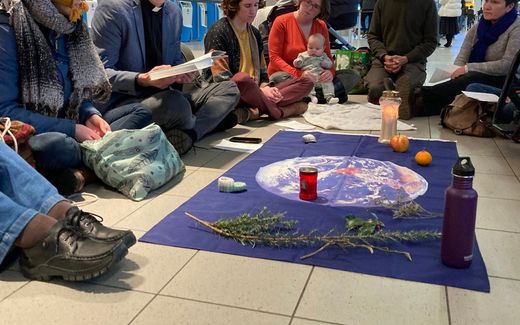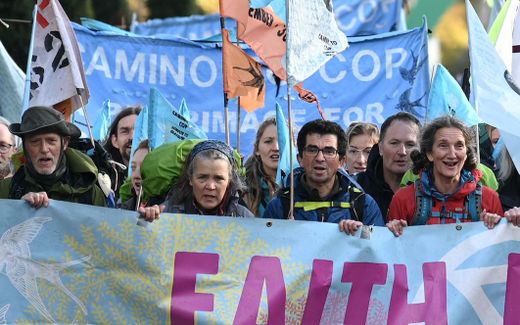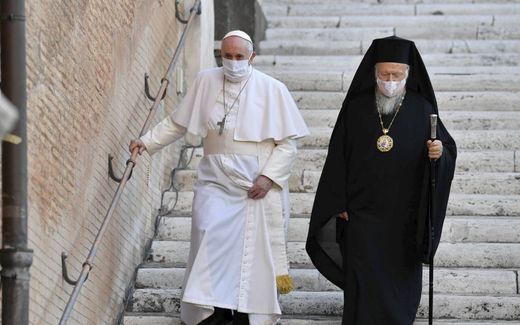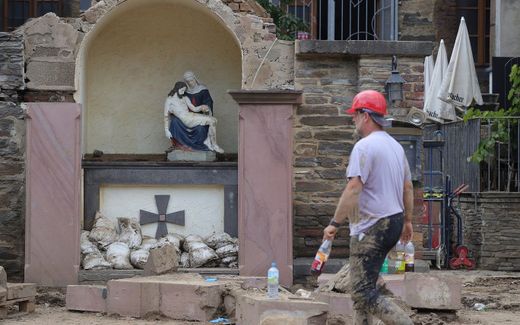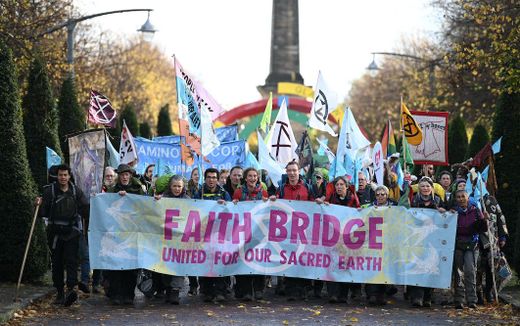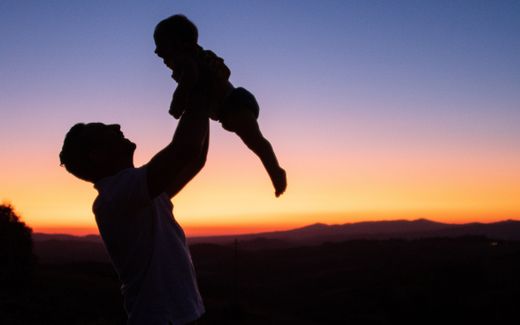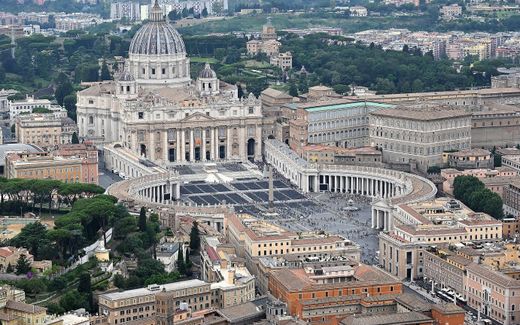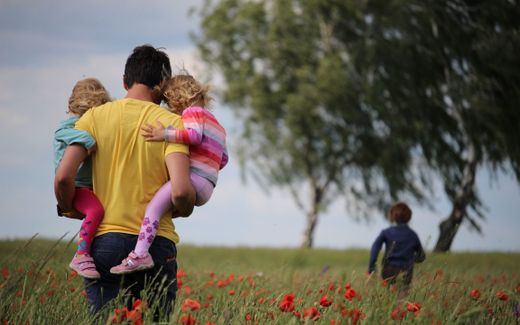Christian climate activist: We are addicted to fossil fuels (Part 2/2)
04-03-2023
Christian Life
Hendrina de Graaf, CNE.news
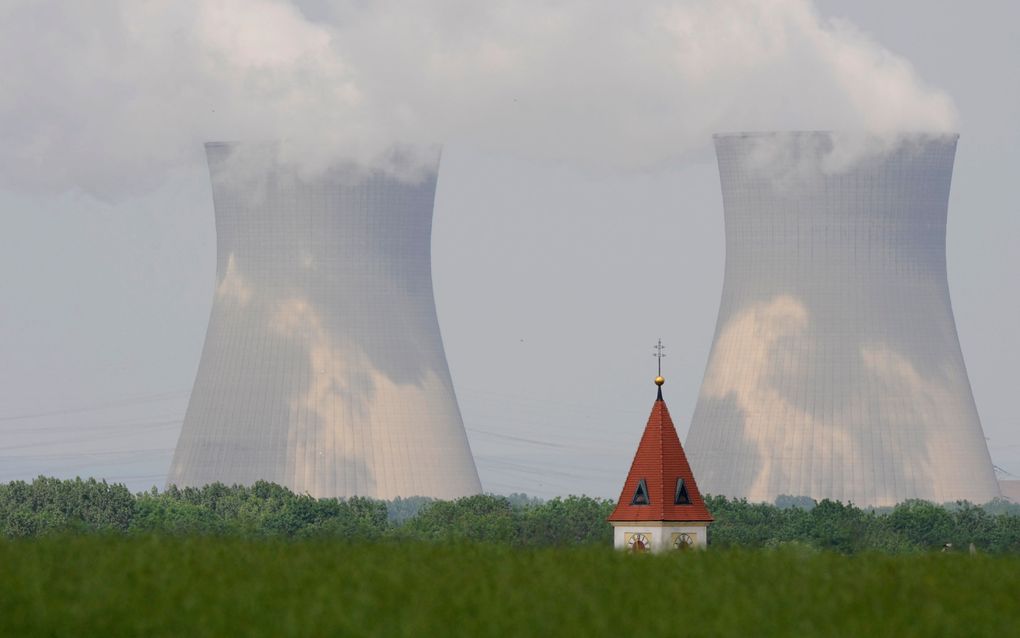
Smoke rises from the cooling towers of a plant in Gundremmingen, southern Germany. Photo AFP, Christof Stache
Christian Life
Kirsten Alblas meets in style: in a restaurant where everything is circular and sustainable. Inside, the waiters serve leftovers from supermarkets (only vegan, of course). The toilets are outside; wind and drizzle have access, but happily, the restrooms have a roof.
This is home for the 39-year-old climate activist. From time to time, she demonstrates against the use of fossil fuels. Other Christians are also catching on.
She knows, also for renewable energy, rare resources are necessary, and people elsewhere are exploited, too, for sustainable goals. Therefore, we have a conversation with the Dutch climate activist Kirsten Alblas on sustainability and being a Christian.
The restaurant is still quiet. Wooden walls create a natural atmosphere. The waiters tell us that the restaurant not yet uses the Too-Good-To-Go-app (where consumers can find leftovers at a lower price): "But we are working on it," a staff member assures.
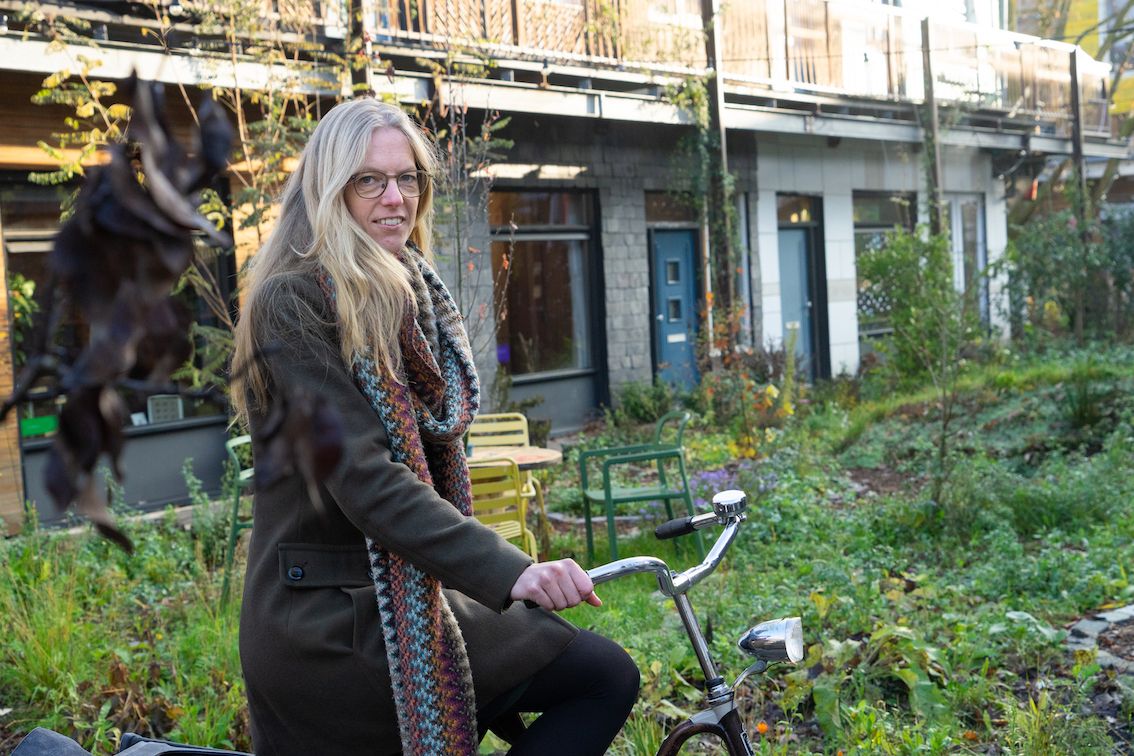
The Utrecht-based Kirsten Alblas became a vegetarian at the age of 14. Participating in climate marches followed later, but "they yielded nothing". In 2019, when her courage was failing her, Extinction Rebellion –XR for short– approached her. Since then, she has been participating in the actions of this organisation. For the Christian version of XR –Christian Climate Action, CCA– Alblas regularly speaks in churches and schools.
How do you shape sustainability in your life?
"I hardly drive a car, don't fly, am vegan and buy very few clothes. The supply of second-hand is enough, and you can also repair clothes. When you find out how much water it took to produce the T-shirt you're wearing, you automatically start using clothes differently."
Do you have a car?
"Yes, but I hardly use it. I think about once every six weeks. I sometimes think about getting rid of it. But then I don't actually want to sell it, but to scrap it. Otherwise, someone else might drive it a lot, and you still have a lot of emissions. Now I just keep it at the door; then I can be sure it hardly drives."
To what extent do you live sustainably?
"I live in a community of four people in a rented house. Renting makes it difficult to live sustainably right from the start. We depend on the landlord for insulation and other sustainability. Since this house might be demolished in a few years, the landlord feels no pressure to install solar panels or insulating glass. So, I heat with gas in a house with plain double-glazing. I do try to keep the heating low, say about 17 degrees. If I sit still, it's not very relaxing, but I then put on a thick jumper or crawl under a blanket."
Would mobile solar panels in the guardian for electric heaters be an option?
"I haven't thought of that yet. But at the end of the day, every climate activist is no saint. Often our personal situation is dragged in when that is not the issue. It is companies and governments that need to take action. My part is minimal. We are in a fossil system because we have become addicted to using fossil fuels. That has to change.
Most of us have a car that runs on petrol, and we heat and cook on gas. This is because our government subsidises it. Consider, for example, steel producer Tata Steel. In the Netherlands, all private households pay 65 euros a year in tap water tax, so we use water sparingly. Very good, of course. However, there is a catch: there is an upper limit of 100 euros. I checked it out once, but if there were no such cap, the Dutch branch of Tata Steel would have to pay 10 million euros a year in this tap water tax. However, they pay 100 euros. So, there is no financial pressure to cut back on water consumption. Whether I cut back or not is hardly significant when compared to the impact companies can make."
When Alblas wondered during a climate march how much sense this action made, she was approached by XR. Soon, they would be holding a training session to shape action. Whether she wanted to come? Alblas accepted. It turns out to be a so-called action training, to think about 'non-violent action' with new activists.
What did you discuss with each other?
"We philosophised about to what extent actions are non-violent. For example, there was a very long corridor where one side stood for non-violent and the other for violent. The people from XR mentioned all kinds of example actions where people could indicate how high they ranked them. The whole corridor –from non-violent to violent– then filled with people. So, it is not as black and white as it seems."
But then it becomes very diffuse, doesn't it? For example, the XR activists may still think a certain action is acceptable, but society perceives it as violent.
"The commitment, of course, is to be non-violent. The same applies to Climate Christian Action. I think the beauty of these organisations is that we have robust conversations about these dilemmas. Just Stop Oil's painting actions were another trigger. And there are different opinions within XR and CCA about whether this is still possible. It is a borderline case, I think. But precisely by conversing with each other, we prevent it from becoming violent."
Isn't that a bit optimistic? You end up being in a bubble with each other. By talking to each other a lot about this, there is a danger that your boundary will shift ever so slightly unnoticed.
"I do not think that's so bad. It's true; there is a left-wing, activist bubble. But these people also have a life outside XR and CCA in other bubbles as well, so you get other impulses too. Staying in conversation with each other keeps you on your toes.
Actions also differ from country to country, and even then, the weighting is different. In England, for instance, you can do other things than here, I imagine, because society is different. There, CCA is much bigger, and many Christian pastors participate. In England, politics and Christianity are much more intertwined than in the Netherlands, for example."
You are also active for a Christian political party. To what extent does that clash with your campaigning?
"No, I was open in my application about my actions at XR. At the party, they said they wanted to represent the entire Christian constituency. That includes me. Only if there is an action against the local government I won't participate. It would be a bit crazy for me to campaign against myself. And so far, I have not been arrested. After all, the police have to issue three warnings first. Until now, I have left demonstrations on time. I am not saying it will stay that way, but I have not made that choice yet."
As a Christian, isn't it rather logical to preach the gospel of forgiveness through Jesus instead of pointing to climate change?
"No. I always say I'd rather act upon my faith than talk about it. If someone else thinks it's important to talk about how good Jesus is, that's fine. But then also show in your life how that works. I don't think the world will get better if we tell everyone to follow Jesus. I do believe the world will be better if we show everyone that we want a just world.
On the contrary, I think Christians should be at the forefront of climate action. The earth was given to us by God to take good care of it. That includes caring for our neighbour. However, we do not do that; we exploit the earth and abuse our neighbour for our greed."
To what extent do you accept that we live in brokenness after the Fall rather than in the Paradise from Genesis 1 that God Himself will restore?
"I believe we live in a broken world. But that doesn't mean we have to twiddle our thumbs until God is going to fix it. We have been given hands and feet to do something with it. In Paradise, we only ate vegetables and no meat. If we want to go back to that, we have to stop eating meat.
And yes, then Christians quickly say: 'It says in Genesis 9 that you are allowed to eat meat, doesn't it?' But just because it says you can, doesn't mean you must. Nor does it mean we can make an industry out of it. In the past, animals could be animals until death; they could live in a herd and had space. Now we kill them when we can no longer use them. From birth, we put them in cages, so they can no longer really be 'animals'. Just as you can dehumanise people, we mistreat animals.
Besides, that is also a bit of cherry-picking. I would have to take this text seriously, while the same people would not expect me, according to another Old Testament law, to sit on the roof of my house now because I am menstruating currently."
Right now, due to increased gas prices, people are becoming more sustainable en masse. Houses are being covered with solar panels and heat pumps, and the government is expanding wind farms. How do you interpret these developments from a climate perspective?
"It is unfortunate that increased energy prices have to be the trigger for something necessary for a long time. I know the Dutch government has been working on an insulation plan for some time. That plan mentioned, among other things, that we should work with circular materials as much as possible.
We also know, for instance, that the mining of cobalt is not always done fairly. We need to pay attention to that too. Or think of people living on the social minimum. For them, it is tough to insulate their house because they have few finances at their disposal. It is crucial to be fair in that respect, too, so that everyone gets the chance to become sustainable."
Research by TNO (Netherlands Organisation for Applied Scientific Research) shows that by 2040 we will need 20 times more cobalt, 40 times more lithium, 20 times more nickel and seven times more rare earths for wind turbines, solar cells and heat pumps, among other things. The conditions in which these raw materials are mined are poor – if we see the images from Congo. A lot of chemical waste is also released. To what extent does care for nature relate to sustainability here?
"As I said before, there is a whole world behind the words' making sustainable'. We shouldn't close our eyes to that. You can live completely 'eco-friendly' without changing your lifestyle. So, then you have only fixed it for yourself, but the other person still suffers. As far as I'm concerned, there should be a lot more research into this field so that we, as consumers, live much more consciously.
We do say that we have abolished slavery, but that is not true. We have only moved it. To the global south, for example, Bangladesh. So, we can put up our solar panels, drive electric cars and then we don't see that we are using slaves, but it is true."
Some people advocate shooting sulphur particles into the air to reflect sunlight. Instead of a thinner ozone layer, this way, we are protected from the sun's heat. How do you look at these solutions?
"I do not know this solution, although I have heard some rumours about it. Let me say this: technical solutions are acceptable but not perfect. Above all, our way of consuming energy needs to change. Otherwise, we will still deplete the earth. In our society, we always want more, but maybe we don't always need more. I wouldn't know why I would need 120 square metres of living space, for example. What would I do with all that space? I have enough with the house I live in, together with other people.
Another example of excessive consumerism is the desserts from Friesland Campina (a Dutch dairy company). That company has a special department that invents flavours for desserts. How come? There was a lot of dairy supply, and the company capitalised on that. What if they had said to the farmers: 'We don't need so much dairy, do less. I really don't understand this choice. Why aren't we just happy with what we have?
To what extent are current environmental developments reversible? Are they not the signs of an ageing earth heralding the coming of Jesus?
"We don't know when Jesus is coming back, do we? It also says in the Bible: 'No one knows the time when the Lord will return.' The signal the earth is giving is a sigh of our consumerism, our greed. Fortunately, according to most scientists, we can still do something about liveability. Until the time Jesus returns, I try to do my part."
Related Articles

